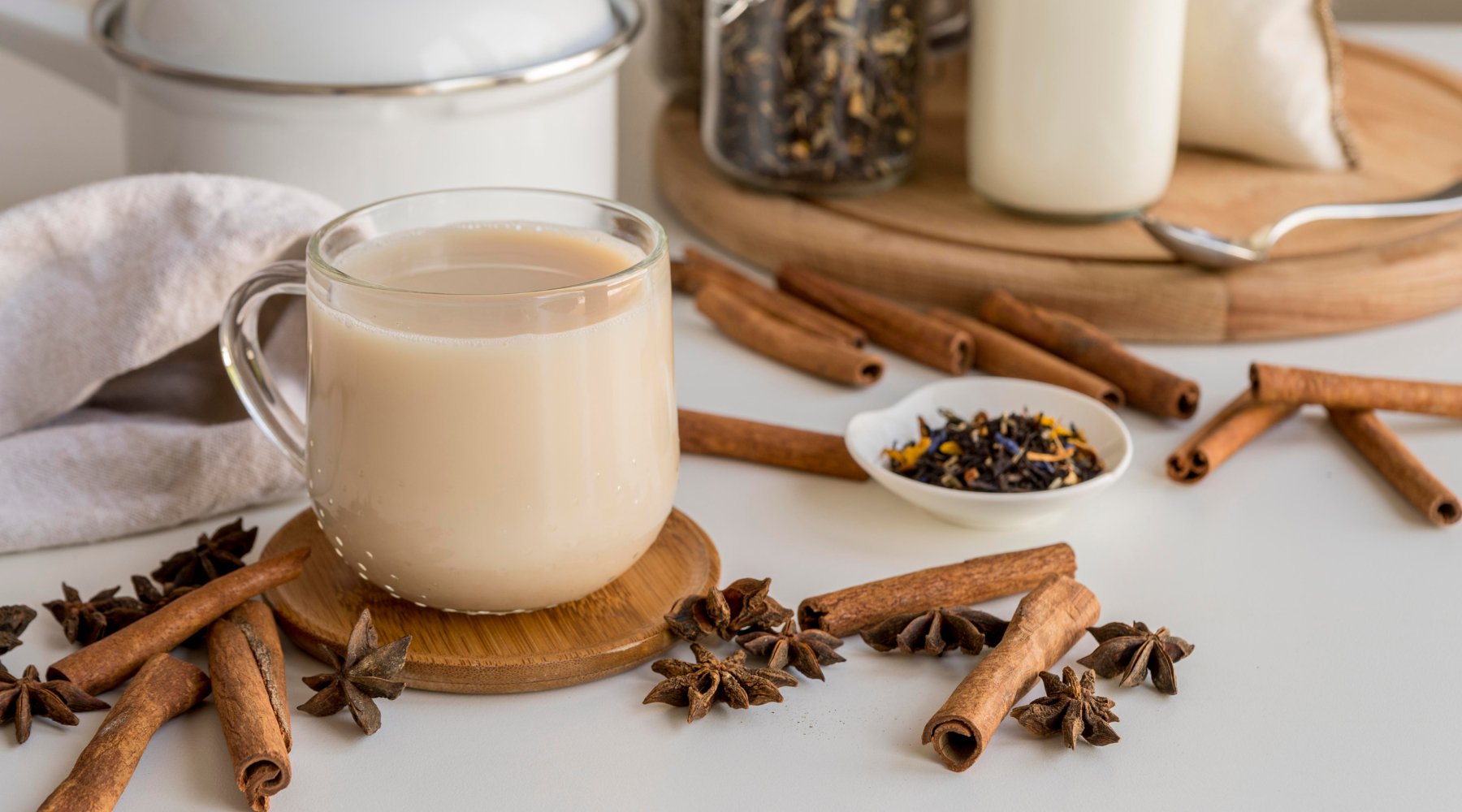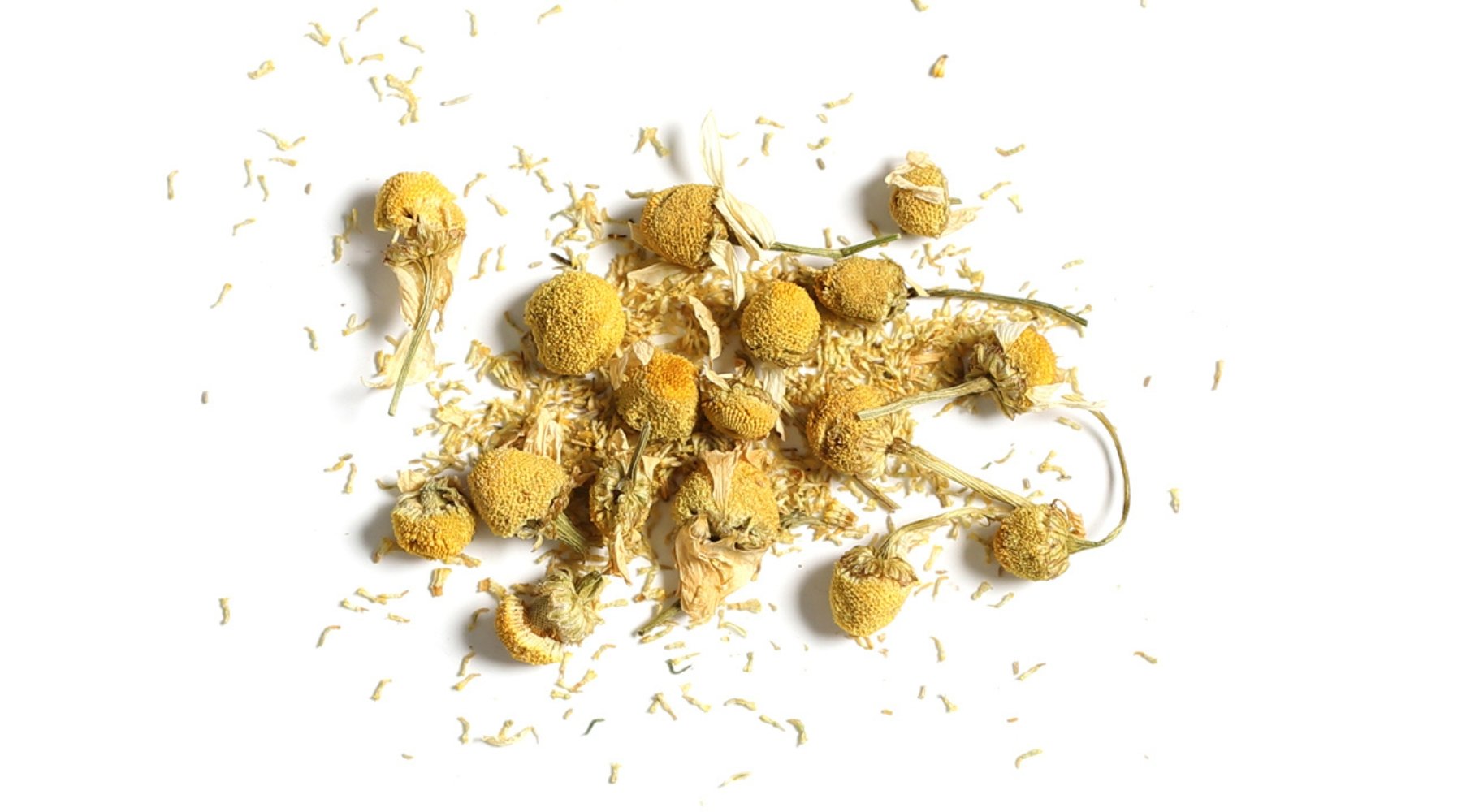
Chai Tea: The Ultimate Guide to Origins, Flavours and More
Chai tea: a cup of warmth and wonder. Spices dance, black tea beckons, and a world of flavour awaits. In this guide, we uncover chai's secrets, from its Indian origins to your mug. Whether you're a chai lover or just tea-curious, get ready for an aromatic adventure into the heart of chai. So, steep in, sip up, and let's begin.
Chai's rich history stretches back centuries, steeped in tradition and culture. We've explored the depths of this beverage, learning from artisans and enthusiasts alike, and now, we're excited to share our discoveries with you. Join us as we unravel everything about chai tea.
What Is Chai Tea?
Chai tea, often simply referred to as "chai," is a beverage deeply rooted in the culture of India. The word "chai" itself means "tea" in Hindi, so when we say "chai tea," we're essentially saying "tea tea," either a testament to its integral role in daily life or repeating ourselves without knowing it!
At its core, chai tea is a blend of black tea (usually Assam or Darjeeling) and a collection of aromatic spices. While the precise recipe can vary widely, common chai spices include cinnamon, cardamom, cloves, ginger, and black peppercorns.
These spices are combined with black tea leaves and simmered with milk and sweetener, creating a harmonious balance of flavours that's both invigorating and comforting.
The result is a beverage that tantalises your taste buds with a symphony of sweet, spicy, and earthy notes. Chai tea isn't just a drink; it's an experience that engages your senses and warms your soul.
In the sections that follow, we'll journey deeper into the history and cultural significance of chai tea, explore its intricate flavour profile, and equip you with the knowledge and skills to brew a perfect cup at home.
Origins and History of Chai Tea

Chai tea, a timeless elixir, has its origins intertwined with the bustling streets and ancient traditions of India. As far back as 5000 years ago, in what is now the Indian subcontinent, people began brewing a concoction of spices and herbs. These early renditions, believed to have been created for their medicinal properties, laid the foundation for what we now know as chai.
The Silk Road and Spice Routes
Centuries passed, and chai's fragrant allure began to extend beyond India's borders. Along the Silk Road and spice routes, traders carried tales of this exotic blend. Spices like cardamom, cinnamon, and ginger were not only highly prized commodities but also essential ingredients in chai. This aromatic infusion soon found its way into the cups of Persian and Chinese emperors, each culture adding its own unique twist.
Colonial Influence and Mass Appeal
The colonial era marked a significant chapter in chai's history. British colonists, captivated by the enchanting brew, adapted it to their tastes, adding milk and sugar. This adaptation became popularised as "chai tea" in Western cultures. Simultaneously, in India, chai underwent a transformation as well, becoming a staple in households and street stalls alike, known as "masala chai."
Today's Global Infatuation
Fast forward to the present day, and chai's global presence is undeniable. It's a comforting companion sipped by people in bustling cafes, a cherished tradition at family gatherings, and an international icon of flavour. The enchanting blend of spices and tea leaves has transcended its humble origins to become a beloved beverage celebrated worldwide.
What Does Chai Tea Taste Like?
The charm of chai tea unfolds in its exceptional flavour profile, where the perfect blend of spices, sweetness, and milk offers a sensory delight.
Spicy and Warm
Chai's flavour profile is intricately shaped by a selection of spices, meticulously chosen and combined to create a warm and invigorating blend. Cardamom, notable for its citrusy and slightly minty notes, plays an important role.
Cinnamon infuses warmth with a touch of sweetness, while cloves introduce a subtle, earthy spice. Black peppercorns contribute a mild kick, and fresh ginger imparts a zesty and slightly pungent note.
Chai's appeal resides in the precise harmony of these spices.
Sweet
To round out the spices, sweetness is key. Traditionally, sugar is used. But, you can choose your preferred sweetener, whether it's honey, maple syrup, or a sugar substitute. The sweetness not only balances the spice but also adds a delightful, comforting dimension to the brew.
Milky (For Chai Latte)
Milk, or a milk alternative for the lactose-intolerant or vegans, is the final note. It brings a creamy, luxurious texture that melds with the spices and sweetener. The milk's richness complements the spices' boldness, creating a well-rounded and velvety chai experience.
Tasting Tips
When savouring your chai tea, take a moment to appreciate its nuances. Here are some tasting tips:
Inhale the Aromas: Before taking your first sip, breathe in the fragrant steam rising from your cup. Chai's aromatic spices are part of the delight.
Sip Slowly: Chai rewards those who sip slowly. Allow the flavours to unfold on your taste buds. Note the initial burst of spice, followed by the soothing sweetness.
Experiment: Chai is highly adaptable. Experiment with the sweetness level, choice of milk, and even the types of spices you use. Make it your own.
Pair with Treats: Chai pairs wonderfully with a variety of snacks, from biscuits and pastries to savoury samosas. The contrast in flavours enhances the experience.
Enjoy the Ritual: Chai is not just a beverage; it's a ritual. Whether you sip it in solitude or share it with friends, take pleasure in the moment.
As you become more attuned to chai's flavour profile, you'll discover its ever-evolving symphony of tastes and aromas. Each cup is an opportunity to explore, enjoy, and appreciate the artistry that is chai tea.
Does Chai Have Caffeine?
Yes, chai tea typically contains caffeine. Traditional chai tea is made by brewing black tea with a mixture of aromatic Indian spices, which are caffeine-free, such as cinnamon, cardamom, ginger, and cloves. Black tea naturally contains caffeine, so unless it's specifically labelled as "decaffeinated chai," regular chai tea will have caffeine. However, the caffeine content can vary based on the type of black tea used and the brewing method. If you're looking for a caffeine-free option, you can opt for herbal chai blends.
Health Benefits of Chai Tea
Chai tea isn't just a flavourful experience; it also brings a range of potential health benefits to the table.
A Blend with Healthful Potential
Traditionally, chai has been associated with several health benefits, partly owing to the spices it contains. Cardamom, a key ingredient, aids digestion and has been used for centuries in traditional medicine. Ginger, another prominent spice, is known for its anti-nausea and anti-inflammatory properties.
Spices and Their Roles
The individual spices in chai contribute to its potential healthfulness. For example, cinnamon, commonly found in chai, has been studied for its potential to help regulate blood sugar levels, which could be beneficial for individuals with diabetes. Cloves are rich in antioxidants, offering potential protection against oxidative stress. Black peppercorns may enhance the absorption of certain nutrients due to their piperine content.
Digestive Aid
One of chai's noted attributes is its digestive support. The combination of spices in chai can promote healthy digestion and ease digestive discomfort. In Indian culture, it's common to enjoy chai after meals for its digestive benefits.
Recent Research Findings about Chai Tea
Recent scientific studies have shed further light on the potential health advantages of chai tea. Research indicates that black tea, a primary component of chai, contains antioxidants known as catechins, which may contribute to heart health and potentially reduce the risk of certain chronic conditions.
Additionally, ongoing studies are exploring the anti-inflammatory properties and immune-boosting potential of chai spices.
It's important to approach these potential health benefits with a balanced perspective. While chai tea offers promise in terms of wellness, individual responses may vary, and it should be enjoyed in moderation. If you have specific health concerns or dietary considerations, consulting a healthcare professional is advisable.
As we savour chai's flavourful complexity, let's also appreciate its potential contributions to our well-being.
Chai Tea Variations
Chai tea, celebrated for its adaptability and complex flavour profile, boasts a diverse array of variations, each offering a unique twist on this popular blend.
Chai's journey through different cultures and regions has birthed an extraordinary tapestry of variations, each with its own story to tell and flavours to savour. These variations expand the horizons of chai, offering a delightful exploration for enthusiasts seeking new experiences within this ancient tradition.
Masala Chai

Masala chai, an iconic Indian classic, is a vibrant blend of black tea and harmonious spices. This aromatic tea begins with the traditional chai base, enriched by the inclusion of spices like cloves, cardamom, cinnamon, and ginger.
The beauty of masala chai lies in its adaptability, allowing for varying spice proportions to suit individual tastes. Furthermore, India's vastness contributes regional nuances to masala chai, with each locale infusing its unique character into it. So, feel free to experiment and add or remove spices.
Herbal Infusions
Herbal chai caters to those preferring a caffeine-free option. Instead of traditional black tea leaves, this variation uses herbs and botanicals. Choices such as lemongrass, chamomile, and peppermint are popular.
Crafting herbal chai involves steeping your chosen herbs in hot water to create a soothing infusion that retains the essence of chai while introducing herbal complexities.
Regional and Cultural Diversities
Chai's global journey has brought about regional and cultural variations. In India, chai undergoes transformations as it travels through diverse landscapes. Kolkata offers "Kullad Chai," served in clay cups for added earthy flavour, while South India presents "Chai Kapi," often brewed with coconut milk.
In Morocco, "Moroccan Chai" showcases anise and nutmeg, while Thailand serves a chilled "Thai Iced Tea" enriched with spices and condensed milk.
These regional and cultural variations highlight chai's ability to adapt and resonate with local tastes and traditions. Exploring these nuances reveals that chai is not merely a beverage; it's a dynamic and ever-evolving expression of culture and creativity.
Chai Tea vs Chai Latte

Chai enthusiasts often encounter a delightful dilemma when faced with the choice between chai tea and chai latte. These two popular variations share common roots but offer distinct experiences in terms of ingredients, preparation, and taste.
Ingredients and Preparation
Chai tea is the traditional blend originating from India. It features a harmonious blend of black tea and an aromatic combination of spices, such as cardamom, cinnamon, cloves, ginger, and black peppercorns. Chai tea is typically brewed by simmering these ingredients with water and milk, then sweetening to taste. The result is a rich and spicy infusion.
Chai latte, on the other hand, is a modern interpretation that adds a creamy twist to the traditional chai. It begins with a base of chai tea. However, instead of a 50-50 mix of tea and milk, like in classic chai, chai latte includes a higher amount of steamed milk, often topped with a dollop of frothed milk. This generous milkiness gives chai latte a smooth, velvety texture that contrasts the bolder flavours of the tea and spices.
Flavour Differences
The primary distinction between chai tea and chai latte lies in their taste profiles. Chai tea showcases the robust and complex interplay of spices and black tea. Its taste is bold, with a pronounced spiciness and a well-defined tea presence. The combination of spices and a touch of sweetness creates a layered and aromatic brew.
Chai latte, on the other hand, features a milder, creamier taste due to the increased milk content. While the spices and tea still provide a flavourful foundation, the overall profile is smoother and less intense. The creamy texture offers a subtle counterpoint to the spices, making it a preferred choice for those who appreciate a mellower chai experience.
Choosing Between Chai Tea and Chai Latte
The decision between chai tea and chai latte often depends on personal preferences and the desired experience.
Opt for chai tea when you're seeking a bolder, spicier flavour with a traditional touch. It's perfect for those who enjoy the full spectrum of chai's intricate spices and want a more authentic, tea-forward experience.
On the other hand, embrace a chai latte when you desire a creamier, milder taste and a smoother texture. It's an ideal choice for those who appreciate the comforting, milkier aspect of chai without the spiciness taking centre stage.
Chai Tea vs Chai Powder
Chai lovers often face thsi question: traditional chai tea or the quick fix of chai powder. These choices offer contrasting experiences, from preparation rituals to flavour profiles and the convenience factor.
Chai Tea
Chai tea is the classic, time-honoured way to enjoy this aromatic blend. It begins with a blend of black tea leaves and a medley of spices, including cardamom, cinnamon, cloves, ginger, and black peppercorns. This blend is simmered with water and milk and then sweetened to taste. The result is a brew that's rich, spicy, and redolent with the complex interplay of tea and spices.
Chai Powder
Chai powder, on the other hand, is a modern adaptation for more convenience. It contains the essence of chai in a powdered form. This powdered mixture typically includes powdered black tea, spices, and often sweeteners, all finely ground together. To prepare a chai beverage with chai powder, you simply mix it with hot water or milk, stirring until well blended. This offers a quicker and more straightforward way to enjoy chai's flavours.
Flavour and Preparation Differences
The primary contrast between chai tea and chai powder lies in their flavour profiles and preparation methods.
Chai tea provides a more authentic chai experience with a pronounced tea presence and the nuanced interplay of spices. Its preparation involves simmering and requires a bit more time and effort, but the reward is a deeply satisfying and aromatic brew.
Chai powder, in contrast, is convenient and swift to prepare but may offer a milder and slightly simplified taste profile. The powdered format sacrifices some of the complexity found in traditional chai, particularly for those who relish the robustness of brewed tea leaves.
Storing Prepared Chai Tea Blends
When it comes to storing chai tea blends, the key is to preserve their flavour and freshness. Here are some guidelines to follow:
Airtight Containers: Transfer your prepared chai tea blend into an airtight container. Ensure that the container is clean and dry before adding the blend. This prevents exposure to moisture, which can lead to flavour deterioration.
Cool, Dark Place: Store the airtight container in a cool, dark place. Avoid direct sunlight, as UV rays can degrade the tea's quality and impact its flavour.
Keep Away from Strong Odours: Chai tea is excellent at absorbing surrounding odours. To prevent your blend from taking on unwanted flavours, store it away from strong-smelling substances like spices, coffee, or pungent foods.
Sealed Bags: If your chai tea comes in resealable bags, ensure the bag is tightly sealed after each use. Squeeze out any excess air before resealing to minimise oxidation.
Temperature Control: Chai tea retains its quality best when stored at a consistent temperature. Avoid drastic temperature fluctuations, which can cause condensation inside the container.
Use Within a Reasonable Time: While chai tea can last for several months when stored properly, it's best enjoyed within a reasonable time frame for the freshest flavour. Check the packaging for any recommended use-by dates.
Buying Chai Tea
Look for brands with a commitment to ethical sourcing, sustainability, and a dedication to preserving the authenticity of chai. One outstanding choice that embodies these principles is Tavalon.
Tavalon meticulously selects top-tier, fresh tea leaves and spices, ensuring that each ingredient contributes to the chai's rich and robust flavour profile. This dedication to quality is evident in every sip. Moreover, Tavalon goes beyond flavour, emphasising ethical sourcing practices and sustainability. We work directly with small tea farms and spice growers in traditional chai-producing regions, fostering fair practices and supporting local communities.
This commitment to ethical sourcing ensures that your chai tea choice aligns with eco-conscious values. What sets Tavalon apart is its unwavering commitment to using no additives or artificial flavours in our chai teas or any of our other tea blends. This means you can savour the pure taste of chai, just as it should be.
Conclusion
In the captivating world of tea, few brews offer the depth and versatility of chai tea.
As you continue your exploration of chai, we encourage you to share your experiences, questions, and insights in the comments below. Your voice adds to the vibrant community of chai enthusiasts, enriching our collective understanding of this traditional infusion. Cheers to the world of chai!





Leave a comment
This site is protected by hCaptcha and the hCaptcha Privacy Policy and Terms of Service apply.